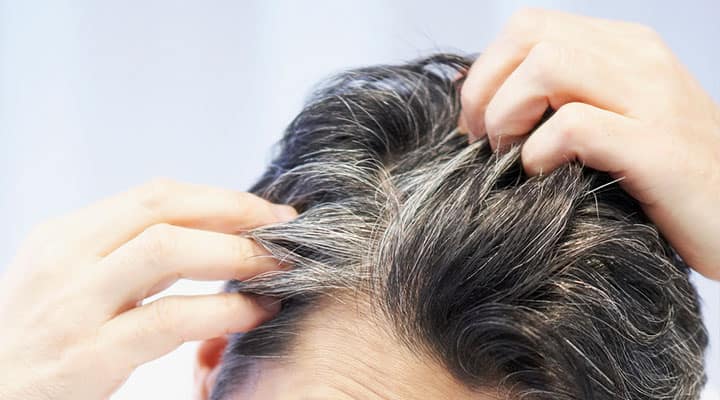
Managing Stress
May ‘Un-Gray’ Your Hair
Managing Stress
May ‘Un-Gray’ Your Hair
There's truth to that old wives' tale that stress turns your hair gray. But researchers at Columbia University published findings in eLife that suggest eliminating psychological stress can revert hair back to its youthful hue.
Timing, however, is everything, according to the study; the gray hair reversal only works in the middle of a hair's transformation from its youthful color to gray, when the stress that was causing the hair to gray is removed. So, ultimately, meditating and other acts of self-care won't change the color of hair that grayed a decade ago—but stressing less may stop a hair in the process of graying from staying gray permanently.
This is great news for people who'd happily trade time spent in a hair salon for some deep breaths on a yoga mat. Beyond that, the research may yield scientific insights that will change the way we understand the aging process, according to the study's authors.
"Understanding the mechanisms that allow 'old' gray hairs to return to their 'young' pigmented states could yield new clues about human aging in general and how it's influenced by stress," they explained. "Our data add to a growing body of evidence demonstrating that human aging is not a linear, fixed biological process but may, at least in part, be halted or even temporarily reversed."
This study offers a fresh perspective on how permanent the process of hair graying is; previous research in mice has shown that stress can activate a cascade of biological events that permanently result in depleted stores of pigment-producing cells. But the Columbia study was done on humans, and the data tells a very different story. "Our data implicate mice have different hair follicle biology, and this may be an instance where findings in mice don't translate well to people," noted researchers.
What is the main cause of gray hair?
As early as your 20s (even sooner, in some rare cases), you may start noticing silver strands in the mirror. This is perfectly normal. There's a reason gray or white hairs are a hallmark of the aging process—we all get them.
Stress, however, plays a role in how early we gray and how much gray hair we have. Studies suggest that long-term psychological stress contributes to higher levels of oxidative stress, which can prematurely trigger hairs to "go gray." But why do they turn gray? This is due to a decline or loss of melanin, the pigment molecule found in your skin, eyes, and hair.
Does gray hair from stress go away?
We hate to be the bearer of bad news, but hair that turned gray during a stressful time of your life is going to stay that color. How you handle this fact is up to you; certainly, many people consider that silver mane as a badge of honor—you got through that time period, after all, and lived to tell the tale! (Or, if you don't love the look, keep that appointment with your hairdresser. The eager anticipation of seeing your "new look" can help boost dopamine levels in your brain, so it's a win-win.)
If you're currently in the throes of a stressful situation, however, your hair's color status is a bit more in flux. Hairs sprout from the roots of hair follicles, and as anyone who "sheds" in the shower or on their brush can attest, individual hairs are in a constant cycle of growth and loss.
While a new hair is in its early stages, chemical signals (like hormones) that cause changes in the proteins and molecules inside your hair shaft may change that hair's hue, draining it of color in response to trying times: stress-induced changes in the mitochondria may be to blame. In other words, stress can induce changes at the molecular level, affecting your hair (not to mention the rest of you!).
This is when making lifecycle changes may slow or halt the graying of your hair. Managing your daily stress levels is good for your whole body, of course—and that includes the hairs on your head!
References
- Rosenberg, Ayelet M. et al. "Quantitative mapping of human hair greying and reversal in relation to life stress." Cell Biology, Medicine, June 2021, https://elifesciences.org/articles/67437
- Trüeb, Ralph M. "Oxidative Stress in Ageing of Hair." Int J Trichology, January 2009, https://www.ncbi.nlm.nih.gov/labs/pmc/articles/PMC2929555/
- Zhang, Bing et al. "Hyperactivation of sympathetic nerves drives depletion of melanocyte stem cells." Nature, January 2020, https://pubmed.ncbi.nlm.nih.gov/31969699/
- "Stress can turn hair gray—and it’s reversible, researchers find." Columbia University Irving Medical Center, June 2021, https://www.sciencedaily.com/releases/2021/06/210622154339.htm
About Our Story Sources
The Life Extension Health News team delivers accurate information about vitamins, nutrition and aging. Our stories rely on multiple, authoritative sources and experts. We keep our content accurate and trustworthy, by submitting it to a medical reviewer.


